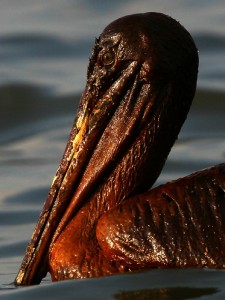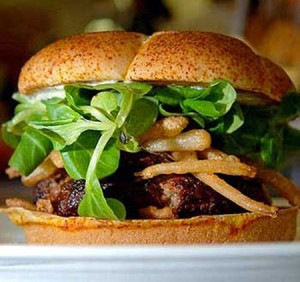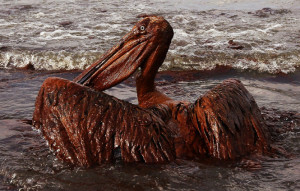METAIRIE, LA — You’ve heard the saying: “when life gives you lemons, make lemonade.” What if life bestowed upon you a broken seam on the ocean floor and out from it spilled millions upon millions of barrels of lemons that washed up on your shore, threatening wildlife, wetlands and local habitat?
Well for many chefs in the region and around the globe, the oil spill in the Gulf of Mexico has been that seed of creativity so badly needed in a waning economy, inspiring gastronomic creations previously unexplored or thought imaginable. The Farm-raised Sole with Bonito Sour Crude Reduction by award-winning chef Julian Bilardello of San Francisco’s Lucine Bistro is just one delicious example that from supply comes demand; abundance renders ideas; from necessity comes invention.
 In a nation forged on self-reliance, rugged individualism and ingenuity, many Americans have turned the Deepwater Horizon oil disaster into a success story not thought possible just weeks ago — none more than our nation’s culinary artists.
In a nation forged on self-reliance, rugged individualism and ingenuity, many Americans have turned the Deepwater Horizon oil disaster into a success story not thought possible just weeks ago — none more than our nation’s culinary artists.
Which makes it all the more troubling for local restaurateurs to learn that White House chefs have not only thus far failed to embrace this new culinary philosophy and fuse it into their menu, they’ve steadfastly refused comment on the concept in general. Requests for comment on this story were also denied.
“This is a time of crisis and I can understand they have their priorities right now but we’ve created an honest and true American success story that you’d think they’d want to be talking about,” said Bruce Mackanin, owner of several Gulf area restaurants including La Calita. “We found a way to make a disaster not only tolerable but quite appetizing as well. Foreign heads of state come to visit and they should see what Americans were able to create when they put their minds to it.”
These tasty creations were first discovered in kitchens around the Gulf region but quickly spread throughout the nation. From what started as “Black Gumbo” in local New Orleans eateries and “Shrimp Scampi a la Brent Sweet Light Crude” in Gulfport, MS, the fusion of disaster has inspired Seattle’s exclusive eatery Boxo (“Lobster Valdez“) to a Tex-Mex variation of a suckling pig roast in Dallas called “Carne Asada El Crudo.” “It’s the most tender pork I’ve ever had in my life,” said one local reviewer. Across the pond, Paris chef Jean Youmans has been said to be experimenting with infusing duck in a pressurized container of liquid propane, he says because crude is so expensive in France and “tres passé.”
And of course at Lucine’s Bistro: “We’re booked solid through August,” says hostess Linda Gallego. “People are lined around the block for lunch and it’s been like that for 2 weeks now. Customers are customers,” she said, admitting that the majority appear to be Census workers. “It still translates into business.”
The dish that keeps them coming back? The sole. “I based it on a Sole Meuniere recipe my grandmother used to make,” said Bilardello, adding that he incorporates a gentle marination in West Texas Intermediate and fresh garlic before pan-frying and glazing with the Bonito Sour reduction.
“We’ve also added a Naptha Koch Salmon that’s grilled on a cedar plank and served with a Senipah Rice Pilaf imported from Indonesia. “A little Senipah goes a long way,” he says, “it’s more of a finishing flavor. I didn’t want to compete with the Naptha Koch and the salmon — two very pronounced flavors on their own.”
The cuisine was also recently featured on Travel Channel’s “Man vs. Food,” where host Adam Richman snacked on “Asphalt Crawfish” — where clusters of the tiny crustaceans are literally ceased together when harvested and remain that way throughout the cooking process to the table. “Absolutely delicious,” Richman said. “The flavor of the crawfish is amazing and it’s so moist.”
Richman later toured the Gulf region and areas effected by the spill before sitting down for a food challenge of 50 “Bayou Choctaw Sour Oysters” and nearly 3 pounds of “South Louisiana Sweet Catfish.” Half-way through the catfish, Richman reluctantly claimed “food won,” however he continued to rave over the variety of flavors the local crude lends the dishes, especially the seafood which he described as “self-marinating.”
But the dish that inspired this wave of culinary delight, fittingly, was the all-American hamburger. Claiming credit for inspiring a nation is Tulsa-based sous chef Manny Arias, who came to Louisiana last month because he thought he could assist in the clean-up efforts. “When BP wouldn’t hire me because I wasn’t a fisherman impacted by the spill, I went to a beach restaurant to figure out the next step and they just happened to be overwhelmed during the lunch shift because of all the BP-employed fisherman and EPA inspectors standing around. Maybe this was how I could help,” he thought, and on his second day of employ, fate dealt him a card he knew was worth investigating.
 The burger that started it all came from humble means. “Pretty simple, I accidentally dropped the patty on the floor — three-second rule, it’s usually okay,” he said. “But when I looked down, I had no idea I had been standing in a pool of South Louisiana Sweet. Apparently it had reached up the beach that far.” Deciding to grill it rather than throw it away, “I figured I’d have it for my staff lunch. It was trash anyway and I was curious how it would flame up.
The burger that started it all came from humble means. “Pretty simple, I accidentally dropped the patty on the floor — three-second rule, it’s usually okay,” he said. “But when I looked down, I had no idea I had been standing in a pool of South Louisiana Sweet. Apparently it had reached up the beach that far.” Deciding to grill it rather than throw it away, “I figured I’d have it for my staff lunch. It was trash anyway and I was curious how it would flame up.
It marinates fast and it’s juicy like a Guinness burger.” The rest — eight ounces of fine ground chuck grilled to perfection, topped with Applewood smoked bacon, onion tempura, arugula and a schmear of truffle mayonnaise served on a modest potato roll with fries — is history.
The fries? “Peanut oil,” Arias says. “There’s no substitute when deep frying. But the crude lends a deeper richness that foods seem to naturally pick up on. It’s a hearty flavor that’s a little smokey and earthy but doesn’t overwhelm the taste of what you’re working with. Best part is that just a quick marinade pulls out all the flavors. Vegetables too. I’ve been glazing carrots with a Thamama Condensate and firing up grilled asparagus with a Canadian Terra Nova and the taste will blow your mind.”
Bartenders have also joined the movement to incorporate this abundance of crude oil they now find closer to their reach. “There were days I’d have to use Mobil One to create my Arab Light Mojito and everyone could taste that it was synthetic,” said Craig Sasser of Floyd’s Royal Tavern in Pines Village. “You could tell the difference immediately. The Arab Light brought out the flavor of the mint and suddenly it’s our hottest seller.” Sasser describes a recent experimentation of “a White Russian that uses Stoli, Sokol and heavy cream, but so far I’ve only been able to get my hands on Siberian Light. It’s disappointing,” he said.
Head bartender Alan Willis of Magnarin’s in the French Quarter has said that as soon as you introduce a fine crude to a equally fine bourbon, “the results are incomprehendable. By the end of a long shift, I admit that several of the staff has been known to slug down straight shots of Williams Sugarland Blend as a reward for another successful night. On it’s own, it’s strong but it grabs you like a fine scotch. The moment they start refining it, the result may get you to work but you start breaking down the flavors. Straight up crude is best.”
 Mackanin said that customers at his restaurants have been requesting one thing and one thing only: “Pelican! No question. So far we’ve been unable to secure one,” he said. “As soon as they find one covered in oil, they clean it off and you’re going to end up with a dry bird. The whole point is maintaining the oil layer so that the roasting process keeps the meat moist. The federal government response has been completely counter to needs of the community,” he added. “Sea turtles too. I know a few chefs who’ve been asking about them and its because they realize the possibilities once they get them in the kitchen.”
Mackanin said that customers at his restaurants have been requesting one thing and one thing only: “Pelican! No question. So far we’ve been unable to secure one,” he said. “As soon as they find one covered in oil, they clean it off and you’re going to end up with a dry bird. The whole point is maintaining the oil layer so that the roasting process keeps the meat moist. The federal government response has been completely counter to needs of the community,” he added. “Sea turtles too. I know a few chefs who’ve been asking about them and its because they realize the possibilities once they get them in the kitchen.”
All of which begs the question why the White House has not gotten more involved in incorporating nature’s bounty into it’s own menu. Bilardello said he immediately offered White House chefs his expertise in using the oil in meal prep but was flatly and quickly denied. “They don’t want our help, that’s fine,” he said, “we have a brief history in using crude in our cooking but we’ve also developed a skillfulness that an outsider might not grasp so quickly. Being familiar with the New Orleans flavor helps. They’re missing out.
“The president has come down for seafood but not OUR seafood.” When asked if he’d be a guest chef at the White House or prepare one of his signature dishes for him on his next visit, Bilardello said, “I’d be honored to.”
>> Follow: @SoapyJohnson on Twitter.
>> Comment: Place it on Lucky Dan on Facebook.



